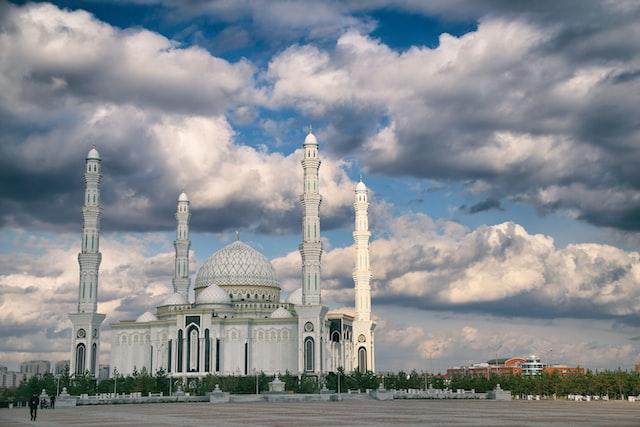
After delivering a highly-anticipated speech to religious leaders earlier this morning, Pope Francis Wednesday celebrated Mass for Kazakhstan’s small minority population, where he lamented the war in Ukraine and said dialogue is the only way to achieve peace.
Newsroom (14/09/2022 8:10 PM Gaudium Press) — After celebrating Mass marking the Catholic feast of the Exaltation of the Cross on his second day in Kazakhstan, the pope pointed to the National Sanctuary of the Queen of Peace in the northern city of Oziornoje, near its lengthy border with Russia.
He noted that a large cross inside the shrine is inscribed with the words “Gratitude to the People of Kazakhstan” and “Peace to Mankind.”
“Gratitude to the Lord for the holy people of God living in this great country, joined to gratitude for its commitment to promoting dialogue, becomes a plea for peace, the peace for which our world so deeply yearns,” he said.
Francis noted that wars and violent conflicts are raging worldwide and pointed specifically to “beloved Ukraine,” which is a stone’s throw from Kazakhstan and has been the site of a brutal war since it was invaded by Russia over six months ago, on Feb. 24.
Kazakhstan, the largest land-locked country in the world, shares some 5,000 miles of border with Russia, making the pope’s words and plea for peace especially poignant given the geopolitical tensions in the region.
“May we never grow accustomed to war, or resigned to its inevitability,” Francis said in his remarks and asked the faithful to assist those suffering and to “insist that genuine efforts be made to achieve peace.”
“What still needs to happen, and how many deaths will it still take, before conflict yields to dialogue for the good of people, nations and all humanity?” he asked, insisting that “The one solution is peace and the only way to arrive at peace is through dialogue.”
He prayed that the world would learn how to effectively build peace and called for an end to the arms race, asking that “the enormous sums spent on war” be converted into “concrete assistance to peoples.”
“I thank all those who believe in this; I thank all of you, and all those men and women who are heralds of peace and unity!” he said.
In his homily, the pope offered Catholics an extended reflection on trust based on the day’s scripture reading from Numbers, in which God saves Israelites bitten by poisonous snakes in the desert by having Moses place “a fiery serpent” on a pole so that those who look at it would be saved.
He contrasted the “serpents that bite” with those that save, saying the serpents that attacked the people targeted only those who lost their trust in God and his promises.
“It is no coincidence that, once the people no longer trusted in God, they were bitten by deadly serpents,” he said, noting that in the Garden of Eden, Adam and Eve were also tricked by a serpent into distrusting God by making them doubt God’s goodness.
“In other words, original sin returns: The Israelites doubt God; they do not trust him; they complain and they rebel against the one who gave them life, and so they meet their death. That is where distrustful hearts end up!” he said and urged attendees to ask themselves whether they truly trust God in times of difficulty or whether they have given in to “disillusionment and despair.”
He also pointed to the “fiery serpents of violence, atheistic persecution,” and times when people’s freedom and dignity have been threatened.
“We do well to keep alive the memory of those sufferings and not forget certain grim moments; otherwise, we can consider them water under the bridge and think that now, once and for all, we are on the right road,” he said, insisting that this is not the case.
Instead, “peace is never achieved once and for all; like integral development, social justice and the harmonious coexistence of different ethnic groups and religious traditions, it must be achieved each day anew,” he said.
Pope Francis then pointed to God’s decision to save the people bitten by poisonous snakes by placing a “fiery serpent” on a pole, an instruction he said was a foreshadowing of Jesus’ incarnation and death on the cross, which was an act of salvation for those infected with the poison of sin.
Yet despite God’s saving action, the poisonous snakes do not disappear but are “always there, lying in wait, ever ready to bite,” he said, saying God does not rid the world of evil but rather “gives us a new horizon: if we keep our gaze fixed on Jesus, the sting of evil can no longer prevail over us.”
“That was the Father’s response to the spread of evil in the world: he gave us Jesus, who drew near to us in a way we could never have imagined,” he said, saying it is from the cross that “we learn love, not hatred; compassion, not indifference; forgiveness, not vengeance.”
“Being a Christian, then, means living without venom: not biting one another, not complaining, blaming and backbiting, not disseminating evil, not polluting the earth with the sin and distrust that comes from the evil one,” he said.
Pope Francis closed his homily asking that faithful be freed of the “poison of death,” and praying that by God’s grace, “we can become ever more fully Christian: joyful witnesses of new life, love and peace.”
At the end of the liturgy, Francis spoke about the renewed violence between Armenia and Azerbaijan, which has flared up over the past few days, calling for peace and harmony in the region.
“I have heard with concern that in these hours, new hotbeds of tension have ignited in the Caucasian region. Let us continue to pray so that also in these lands, so there may be peace and harmony,” he said.
– Raju Hasmukh with files from Crux Now